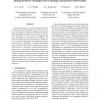Free Online Productivity Tools
i2Speak
i2Symbol
i2OCR
iTex2Img
iWeb2Print
iWeb2Shot
i2Type
iPdf2Split
iPdf2Merge
i2Bopomofo
i2Arabic
i2Style
i2Image
i2PDF
iLatex2Rtf
Sci2ools
103
click to vote
NDSS
2008
IEEE
2008
IEEE
Taming the Devil: Techniques for Evaluating Anonymized Network Data
Anonymization plays a key role in enabling the public release of network datasets, and yet there are few, if any, techniques for evaluating the efficacy of network data anonymization techniques with respect to the privacy they afford. In fact, recent work suggests that many state-of-the-art anonymization techniques may leak more information than first thought. In this paper, we propose techniques for evaluating the anonymity of network data. Specifically, we simulate the behavior of an adversary whose goal is to deanonymize objects, such as hosts or web pages, within the network data. By doing so, we are able to quantify the anonymity of the data using information theoretic metrics, objectively compare the efficacy of anonymization techniques, and examine the impact of selective deanonymization on the anonymity of the data. Moreover, we provide several concrete applications of our approach on real network data in the hope of underscoring its usefulness to data publishers.
Anonymization Techniques | Computer Networks | Data Anonymization Techniques | NDSS 2008 | Network Data |
Related Content
| Added | 01 Jun 2010 |
| Updated | 01 Jun 2010 |
| Type | Conference |
| Year | 2008 |
| Where | NDSS |
| Authors | Scott E. Coull, Charles V. Wright, Angelos D. Keromytis, Fabian Monrose, Michael K. Reiter |
Comments (0)

